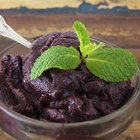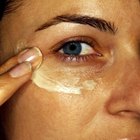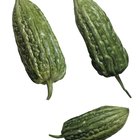
photomaru/iStock/Getty Images
Melasma is a skin condition characterized by brown or gray patches on your face and, according to the American Academy of Dermatology, the causes of this condition are unknown. It may fade on its own or require topical treatments that will lighten your skin. Grapefruit seed extract contains vitamins and antioxidants that may help treat certain skin conditions. However, do not use any at-home remedies without first discussing them with your doctor.
Definition of Melasma
Melasma is a skin problem that plagues women more than men, the AAD reports. While it most often forms on your cheeks, nose, forehead, chin and upper lip, it may also crop up on your forearms and neck. Those with darker skin tones are more likely to develop this condition, and you are also more prone to it if you have a family history of melasma. Pregnancy, birth control, sun exposure and allergic reactions to certain cosmetic products can all cause the condition to develop.
Definition of Grapefruit Seed Extract
Grapefruit seed extract is high in vitamin C, potassium, folate, iron, calcium and other vitamins and minerals. It detoxifies your body and has antibacterial, antifungal and antiviral properties. It also contains plant chemicals like bioflavonoids that can help prevent certain cancers as well as heart disease. The extract is made when the pulp and seeds are converted into a highly acidic liquid that is amber in color.
Usage for Skin
According to Health Psychology, you can apply grapefruit seed extract on top of your skin to treat acne as well as certain skin conditions caused by fungus and bacteria. Consuming the extract can help strengthen your immune system, leading to healthier skin overall. The antioxidants in grapefruit seed extract can help ward off free radicals and other types of sun damage that may harm your skin and make your melasma look worse. However, the benefits of this extract for the condition are minimal, and it is unlikely that it will lighten your discolorations.
Considerations
Due to the high acidic nature of grapefruit seed extract, applying it topically may cause your skin to burn or sting, particularly if the area has any open wounds or a sunburn. Also, if you are allergic to citrus fruits, do not consume or apply grapefruit seed extract because it can cause an adverse reaction.
Warnings
According to Holistic Online, grapefruit seed extract can interfere with many medications because it interrupts your body’s ability to absorb medicine and may lead to a toxic overdose. These medications include those prescribed for high cholesterol, blood pressure, antihistamines, psychiatric medications, immune suppressants and other drugs. Do not use or apply the extract without checking with a physician, and discontinue using it if you experience any reactions.
Related Articles

Acai Berry & Acne

The Benefits of Lemongrass for Skin

The Best Facial Moisturizers for People ...

Negative Side Effects of Paba

How to Make Acne Scars Go Away

List of Retinoids

The Use of Neem Juice in Skin Care as ...

How to Get Rid of a Dark Line Above My ...

Bitter Melon for Acne

How to Lighten Birthmarks

How to Apply Dr. Palmer's Fade Cream

What Are the Benefits of Aloe Vera & ...

Herbs For Melasma

How to Reduce Acne Inflammation

How to Get Rid of Purple Scars

How to Get Rid of Scars With Wheat Germ ...

How to Make Organic Ink

What Are the Benefits of Lemon Juice ...

Manuka Honey & Rosacea

What Are the Benefits of Extrapone ...
References
Writer Bio
Lynne Sheldon has over 12 years of dance experience, both in studios and performance groups. She is an avid runner and has studied several types of yoga. Sheldon now works as a freelance writer, editor and book reviewer. She holds a Bachelor of Arts in English and art history from Boston University and recently completed her Master of Fine Arts in writing from Pacific University.
Photo Credits
photomaru/iStock/Getty Images